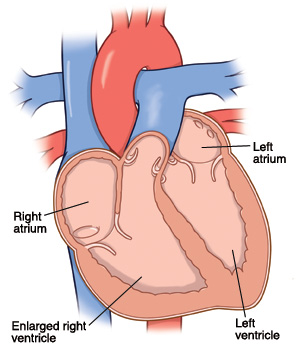Right-Sided Heart Failure

The heart is a major muscle that pumps blood throughout the body. Blood carries oxygen to all the organs including the brain, muscles, and skin. After the body takes the oxygen out of the blood, the blood returns to the heart. The right side of the heart collects that blood and pumps it to the lungs to get fresh oxygen. This oxygen-rich blood from the lungs then returns to the left side of the heart. There it's pumped back out to the rest of the body including the brain, starting the process all over.
Heart failure occurs when the heart muscle is unable to meet the needs of the body as a result of heart muscle weakness or stiffness, or a heart valve problem
When the right side of the heart is failing, it can’t handle the blood it's getting from the rest of the body. This blood returns to the heart through veins. When too much pressure builds up in the veins, fluid leaks out into the tissues. Gravity then causes that fluid to spread to those parts of the body that are the lowest. One of the first symptoms of heart failure is swelling in the feet and ankles. If the condition gets worse, the swelling can even go up past the knees. In more severe cases, the liver and intestines may also become congested with extra fluid.
Causes of right-sided heart failure
-
Coronary artery disease
-
Heart attack (acute myocardial infarction) in the past
-
Left-sided heart failure
-
High blood pressure (hypertension)
-
Damaged heart valve
-
High blood pressure in the lungs (primary pulmonary hypertension)
-
Secondary pulmonary hypertension because of conditions, such as blood clots in the lung or underlying lung disease
-
Obesity with severe sleep apnea
-
Chronic cigarette smoking resulting in COPD (chronic obstructive pulmonary disease)
-
Alcohol abuse with left-sided heart failure
-
Illegal drug use, such as methamphetamine
-
Cardiomyopathies that cause weakened heart muscle
-
Pericardial diseases that affect the lining or the sac around the heart
-
Heart problems you are born with (congenital heart diseases)
Treatment
Heart failure is usually a chronic condition. The purpose of medical treatment is to improve the pumping action of the heart, and remove extra water and fluid from the body. A number of medicines can help with this, improve symptoms, and prevent the heart from becoming weaker. Heart procedures and surgery can help, depending on the cause of the right-sided heart failure. In some cases of severe heart failure, a mechanical device can be implanted to help the heart pump. Another major goal is to better treat the causes of heart failure. These include heart disease, high blood pressure, and your lifestyle.
Home care
-
Check your weight every day. A sudden weight gain could mean heart failure is getting worse.
-
Use the same scale every day.
-
Weigh yourself at the same time every day. Wear the same type of clothing or remove your clothing.
-
Make sure the scale is on the floor, not on a rug.
-
Keep a record of your weight every day so your healthcare provider can see it. If you are not given a log sheet for this, keep a separate journal for this purpose.
-
Cut back on how much salt (sodium) you eat:
-
Your healthcare provider will tell you what amount of salt you can have daily. This is usually 1,500 mg or less.
-
Limit high-salt foods. These include olives, pickles, smoked meats, processed foods, and salted potato chips.
-
Don't add salt to your food at the table. Use only small amounts of salt when cooking.
-
Follow your healthcare provider's advice about how much fluid you should have.
-
Stop smoking.
-
Stop using illegal drugs.
-
Cut back on the amount of alcohol you drink.
-
Lose weight if you are overweight. The extra weight adds a lot of stress on the heart.
-
Stay active. Talk with your provider about an exercise program that is safe for your heart.
-
Keep your feet elevated to reduce swelling. Ask your provider about support hose to help prevent daytime leg swelling.
-
Follow your healthcare provider's instructions closely.
Besides taking your medicine as instructed, an important part of treatment is lifestyle changes. These include diet, physical activity, stopping smoking, and weight control.
Improve your diet. Often in the hospital, people are given a heart healthy diet. This includes more fresh foods, lower fat, less processed foods, and lower salt.
Follow-up care
Follow up with your healthcare provider, or as advised. Make sure to keep any appointments that were made for you. This can help better control heart failure.
If any tests were done, you will be told of any new findings that may affect your care.
Call 911
Call 911 if you:
-
Become severely short of breath
-
Feel lightheaded, or feel like you might pass out or faint
-
Have chest pain or discomfort that's different than usual, the medicines your provider told you to use for this don't help, or the pain lasts longer than 10 to 15 minutes
-
You suddenly develop a rapid heart rate
When to get medical advice
Call your healthcare provider right away if you have any of these signs. They may mean your heart failure is getting worse:
-
Sudden weight gain. This means 2 or more pounds in 1 day or 5 pounds in 1 week, or whatever weight gain you were told to report by your provider.
-
Trouble breathing not related to being active
-
New or increased swelling of your legs or ankles
-
Swelling or pain in your abdomen (belly)
-
Breathing trouble at night. This means waking up short of breath or needing more pillows to elevate your upper body to breathe.
-
Frequent coughing that doesn’t go away
-
Feeling much more tired than usual